2020.09.09
SDGs17ゴールの達成に向けた事業開発
[Vol.3] Agriculture in Africa: challenges and opportunities
Passion of Young Entrepreneurs in reforming agricultural sector in Republic of Ghana
Debbar, Hiba
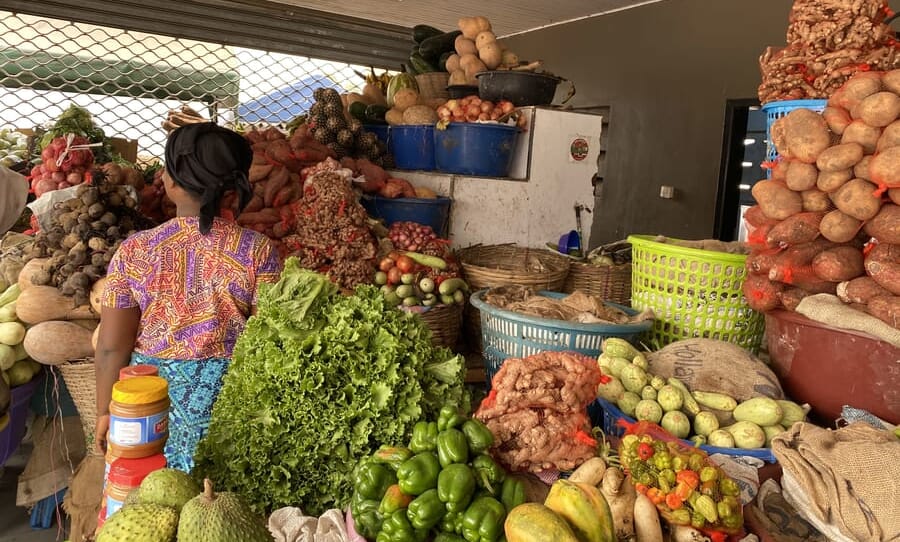
Summary
- ・The Republic of Ghana, familiar to Japanese with its cocoa, has tremendous potential for Agriculture. Despite its popularity, the majority of the smallholder farmers are still suffering from poverty due to multiple structural factors.
- ・Despite the government support to increase farmers’ productivity, the lack of market access between urban markets and farmers is a lingering issue. Poor road infrastructure and high transportation cost prevent locally produced goods from reaching the main markets, making Ghanaian consumers prone to purchasing imported goods, and the country’s dependent on food imports.
- ・Local start-ups, mainly led by young people in passion, have been established to bridge those gaps by using innovative technologies to improve the productivity of farmers, as well as their market access. Japanese companies are called for to not only provide technical and financial support, but also orchestrate various entities in the market to interact and share the value creation.
- ・ガーナ共和国、日本ではカカオ豆の生産国として知られているこの国の農業は、非常に大きな可能性を有している。その知名度が高いにも関わらず、いくつもの構造的な課題が原因で、小規模農家の大半は依然として貧困に苦しんでいる。
- ・農業従事者の生産性向上に向けた政府の支援は存在するが、都市部市場と農業従事者とのアクセスは十分に確保されていないことが依然課題として残っている。道路インフラが十分に整備されておらず輸送費も高いことから、国内生産物が主要市場に出回らないため、ガーナの一般消費者は輸入品を購入する傾向にあり、国としても輸入食品に依存している状況にある。
- ・ガーナ国内では、革新的なテクノロジーによって農業従事者の生産性や市場へのアクセスを向上させ、ギャップの解消を目指すスタートアップ企業が熱意ある若者によって設立されている。日本企業は技術的・財政的支援だけでなく、さまざまな市場の関係者が価値の創造に向けて各自の役割を担い連携していけるよう、その調整役となることも求められている。
◆日本語で読む◆
Overview of the agriculture sector in Africa
There is a consensus that sustainable agriculture and rural development play a fundamental role in the attainment of the Sustainable Development Goals (SDGs) in Africa, particularly in the eradication of hunger and poverty.
In most African economies, African Development Bank (AfDB), a leading regional financial institution, reckons that the agriculture sector is the main contributor to job creation, however the majority of agricultural activities do not suffice to secure the livelihoods of smallholder farmers who currently dominate a big portion in the sector.
Throughout years, many efforts have been made to increase productivity and improve Agriculture infrastructure by governments. Nevertheless, very little attention has been paid to immature agricultural market structure and –value addition to agriculture products. As matter of fact, in Agricultural development, increasing yield is only half of the equation; value addition and marketing are equally important. Consequently, even though improvement measures could be implemented in seeding and harvesting, enormous post-harvest losses, value addition deficits as well as weak market linkage hinder the development of the agriculture sector in Sub-Saharan Africa.
According to the AfDB, the level of agro-processing at the rural level in Africa is perceived as extremely primitive even compared to that in other developing nations. As the result, Sub-Saharan African countries face huge post-harvest losses. To depict it, one instance is that perishable agro-commodities such as fruits and vegetables count for average 35-50% of the post-harvest losses in the total attainable production, as for the losses of grains, they are between 15 to 25% [1]. Moreover, the low level of the agro-processing capacity worsens Sub Saharan countries’ dependency on imports of primary foods and processed products. This creates a vicious cycle for the agricultural development in sub-Saharan Africa.
A World Bank report issued in 2013 indicates that Africa’s farmers and agribusinesses could create a trillion-dollar food market by 2030 [2], if they can expand their access to more capital and electricity, better technology and irrigated land to grow high-quality and nutritious foods. These projections suggest that agriculture would offer the greatest prospects for a threefold increase in the GDP of African countries.
To investigate growing agribusiness opportunities, we visited the Republic of Ghana to study its local agricultural markets. Ghana is the largest cocoa producer after Cote d’Ivoire with a production of more than 812 thousand tons in 2019 [3], it has the potential to further advance the country’s agribusiness. Big potential can also be found in maize and rice productions, two very attractive crops to Japanese companies, especially processing equipment manufacturers. In addition, the country is renowned as an investor-friendly business environment in West Africa was an additional factor for us to choose the country for this study.
Case study: The Republic of Ghana
We conducted a study in three locations: Accra, the capital city of Ghana to investigate business environment, then in Tamale and Wa where the fields are located to investigate agriculture’s condition.
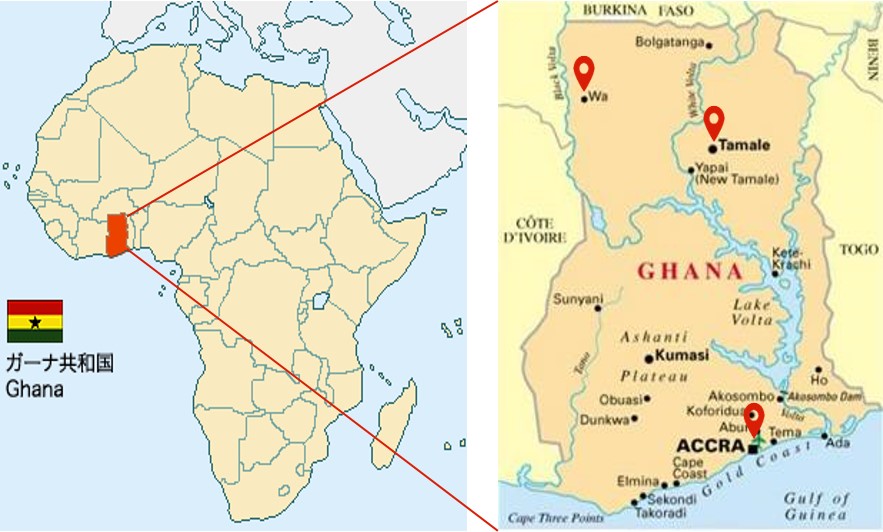
Map of QUNIE’s research points
In the Republic of Ghana, Agriculture’s contribution to the GDP accounted for 19.7% in 2018 [4]. Overall, the average size of Ghanaian farmers is predominantly smallholder, and they rely on traditional tools and rain-fed as water source.
a. Business environment
First, the important component of this study was to investigate the business, environment; therefore, we conducted an interview with an expert of investment in the agricultural sector at the Ghana Investment Promotion Center (GIPC).
This interview further revealed numerous motivations offered by the Ghanaian government under the “Investment Act” in order to encourage foreign investments by introducing incentives such as:
- Tax holidays to the new entrants
- Guarantees against discrimination
- Guarantees against expropriation
- Investment guarantees , transfers of capital, profits and dividends and personal remittances
- Guarantees in dispute resolution
b. Government programs in the field of Agriculture
With regard to the agriculture sector’s growth, particularly food crops, the lasting contribution of the Ghanaian government made it possible. An interview with a senior agriculture officer from the Ministry of Food and Agriculture showed that the “Planting for food and jobs” program implemented since 2017 has enhanced agricultural productivity of food crops subsector; it was designed to focus on five areas to mainly improve quality of products to an extent that they can become competitive agro-products in the market.
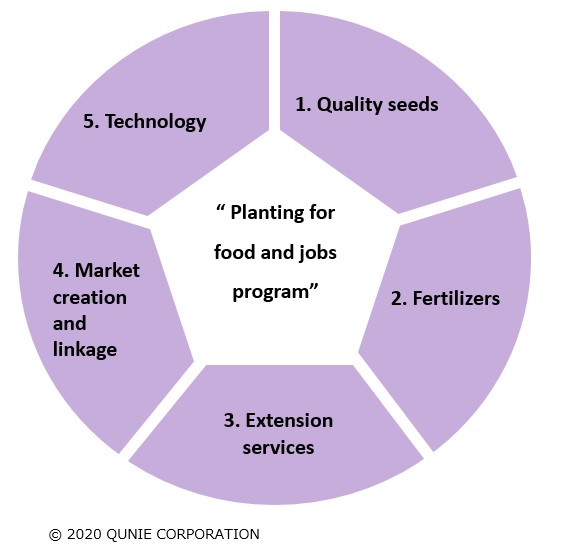
Focal areas of “Planting for food and jobs”
Figure created by QUNIE based on the interview.
According to the senior officer, incentives brought by the government’s program particularly on imported quality seeds and fertilizers, enable the farmers to buy the seeds and fertilizers with 50% discount, added to complementary services such as extension services have significantly improved productivity of the famers. Nevertheless, marketing of output is still a problem, smallholder farmers are still in the situation of consuming their products to subside or, in best-case scenario, farmers sell their products in the local community markets. They never enter the value chain or commercialize in the main markets. In other words, the government is still unable to improve the weak market linkage and Agriculture mechanization. The ministry officer believes that private companies can bring farmers to the appropriate value chains by deploying appropriate means such as establishing supply chain, construction of processing facilities…
c. The domestic Market
According to the government expert from the ministry of Agriculture, the most important food crops in Ghana are:
- Maize
- Rice
- Vegetables: tomato, onion, pepper, cabbage, carrot, lettuce and cucumber
- Soy bean
- Cowpeas
We observed that the food markets extremely differ between urban and rural areas in terms of price, product availability, and market conditions.
The pricing process is not transparent to consumers in local markets. As matter of fact, shopkeepers give random prices to commodities based on their visual appreciation of the quality without using specific criteria (such as weight or number of items…) for its determination, in other words, the shopkeeper just looks at the commodity and gives a price. Moreover, due to high logistics cost, the price is sometimes doubled in the urban areas compared to local areas. This causes dramatic and sudden changes in prices for agricultural products thus leading to unstable farmer’s incomes.
It is important to note that super markets in the urban areas largely sold imported goods, and the stores’ ambience looked clean and decent like those seen in developed countries, however the same level of cleanness is not found in the rural areas. This issue reflects on the perceived quality and reputation of local goods. Perceived quality is a major factor in consumer purchasing decisions and is the main reason why consumers prefer imported goods. Local products are •often associated with poor quality and uncleanness.
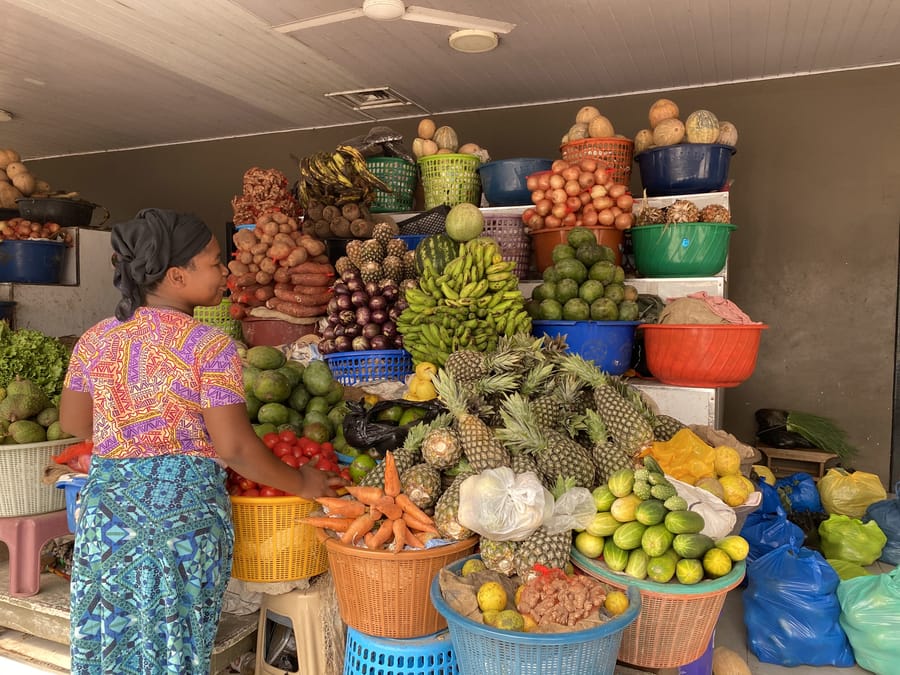
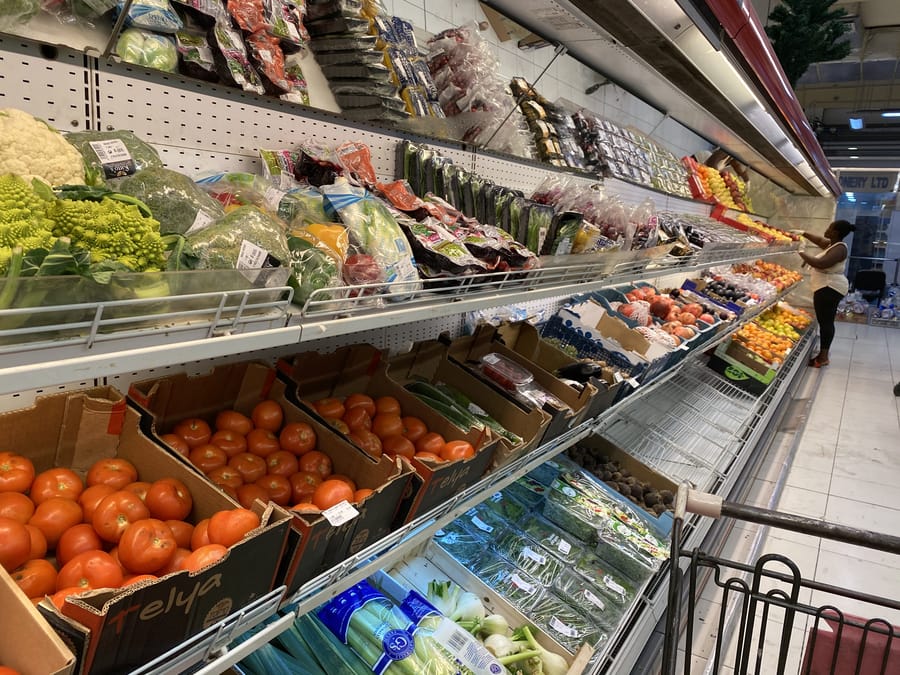
A fruit and vegetable vendor in a local wet market and a super market in Accra
Due to the lingering problems of post-harvest losses and low value addition, Ghana heavily depends on food imports. In fact, during our visits to a local supermarket, most of the goods sold on the shelves were imported from European or Asian countries. Moreover, research shows that in the case of rice, which is the second most important crop in Ghana, 85% of the consumed rice is imported from Asian countries. This situation of high import bills implies a heavy burden on the national GDP, and puts the country’s food security at risk, if food imports are blocked by other countries for example.
d. Lives of the farmers
For the third part of the study, we have conducted field visits to the local farms in the northern region of Ghana, in the city of Tamale and suburbs of the city of Wa, where Maize fields are located.
1. Farmers’ collectives
We found that there are cooperative organizations called “Farmers Based organizations” (or FBOs) where Ghanaian smallholder farmers gather. The organization usually comprise of around 100 farmers per FBO at most and generally managed by people with basic management skills who are able to support farmers in their daily activities.
Most of them are illiterate, thus, joining FBO is their best solution to increase their bargaining power in the markets. In fact, the farmers in these regions have no access to primary education, also their farming methods are passed down for generations.
Illiteracy is a big social problem which traps them into the difficult situation where significant development of the Agriculture sector is hardly expected. But, in the meantime, FBOs are regarded as an effective cooperative model to support smallholder farmers in labor activities, production through farming advice and procurement at a daily level. In many cases, these cooperatives collect a fee from members in order to provide these services.
2. Difficulties of the farmers
The field trip to the local farms showed that farmers face several difficulties in their daily activities, among other things we can cite:
- The lack of infrastructure
- The lack of agronomy knowledge
- Abandoned farming lands due to slash and burn agriculture
- The lack of equipment
- The absence of irrigation
- Natural disasters: bush fires (natural or human caused) and heavy rain
- Lack of access to post-harvest knowledge and technologies (storage, transportation…)
These difficulties are all regarded as business opportunities, companies with the expertise and solutions for the above issues, such as irrigation infrastructure companies, training providers, equipment for mechanized farming manufacturers and distributors are very needed to enter the market. These companies will not only contribute to the effective growth of the sector but will surely secure profitable market share at an early stage of this growing market.
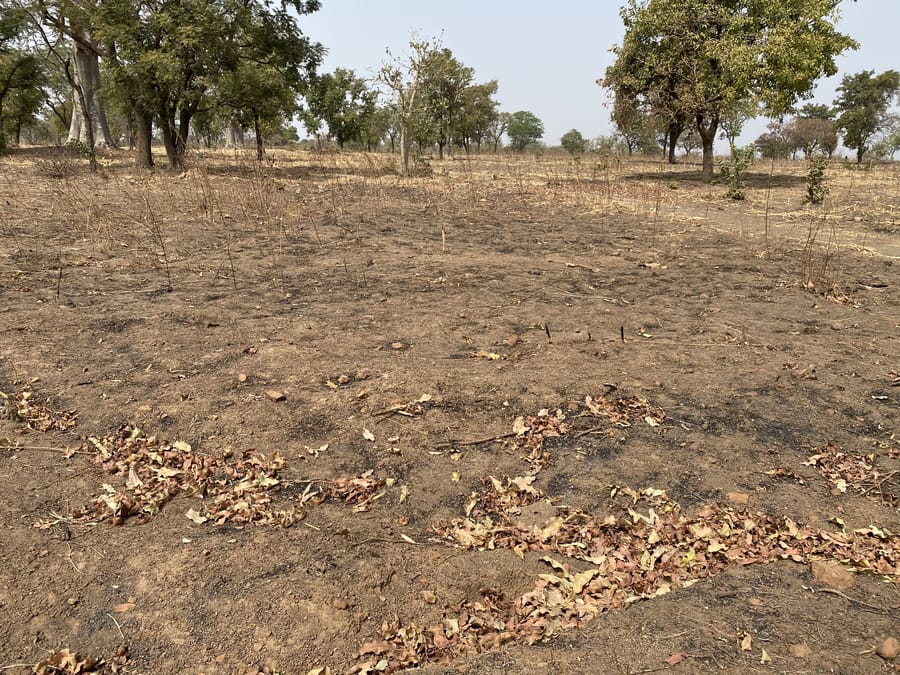
Image of a maize field damaged by bush fire (loss of 8 hectares)

Image of storage conditions in a maize warehouse resulting in post-harvest losses
e. Agribusiness private companies
Our findings show that government programs have long been related to enhancing production and improving post-harvest processes such as storage of end products and hygiene management. Nevertheless, these programs have yet to include processing and market creation for the local products. In fact, processors specialized in milling packaging or other processing operations are concentrated in the big cities, whereas the producers are mainly located in the remote rural areas. This situation has created a new market for brokers. Brokering companies greatly relieve the farmers’ burden of market access, they also contribute to the improvement of agriculture productivity. Their typical business model is that the companies offer extension services and agriculture advice to the farmers in order to guarantee the contracted production amount.
An example of these companies is DEGAS LTD, a Japanese start-up operating in Ghana. Their business model is to pre-finance fertilizers to smallholder farmers, who will pay back in maize rather than cash after the harvest season. The company cleans the maize, packages and sells it to processors. DEGAS LTD. sometimes also buys the extra yield from the farmers -if any- against cash. This is a win-win situation for both parts, making the farmers: have better access to seeds, fertilizers and clients, and DEGAS LTD. ensures the supply of raw material to their clients in processing industry.
Another example having a similar business model is AGRICARE LTD, a local company manufacturer of feed products, who also provides support of seeds fertilizers and training to the farmers.
Perspectives and opportunities in Ghana
A rising trend in the country is digitization. ICT seems to be the future of agriculture in the eye of young entrepreneurs.
As part of this mission, we visited the Kosmos Innovation Center (KIC), an incubation center located in the capital city of Accra. The center is founded by Kosmos Energy, an American oil company operating in Ghana.
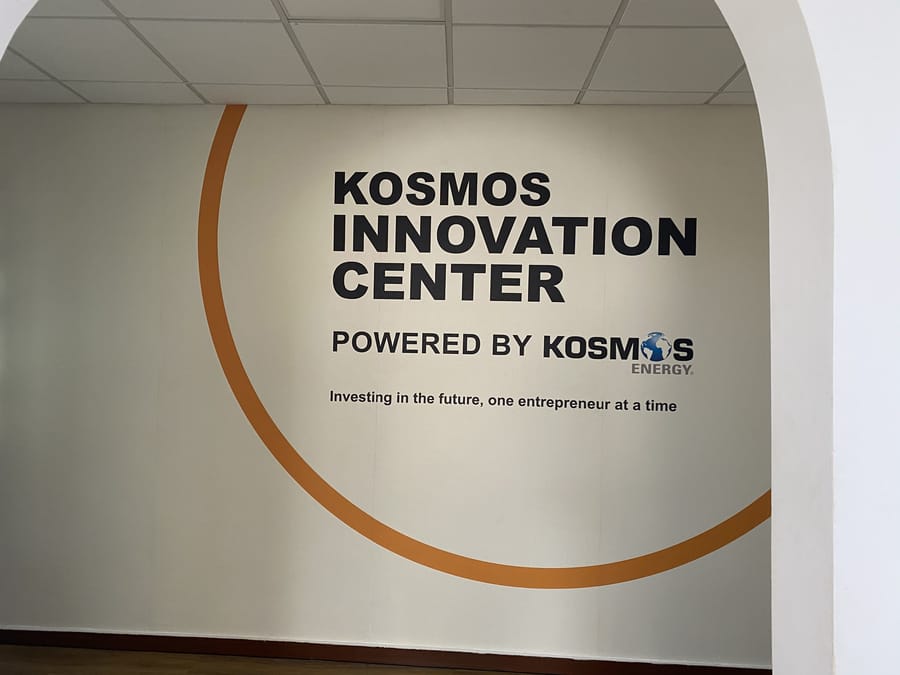
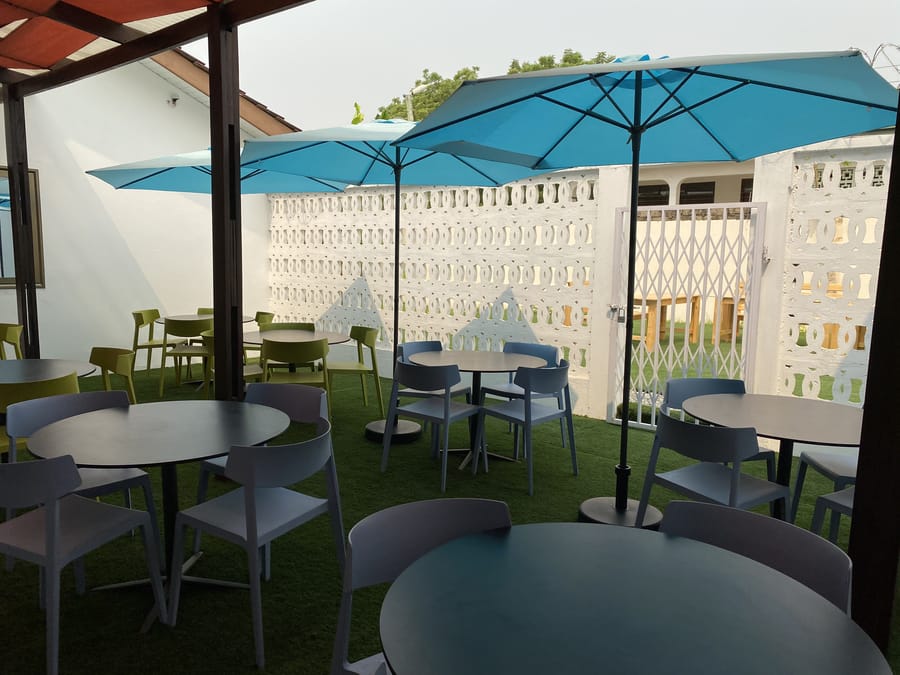
Kosmos Innovation Center
Discussion with one of the leaders who actually tenants the center’s working space expressed their openness to various sources of human resources and investment. They are very keen to work along with companies from different origins such as Japan to improve the quality of their accelerator and investment programs.
It is notable that entrepreneurs working there were full of passion to innovative ideas that would greatly contribute to the development of agriculture. To illustrate this, here are some examples:
- TROTRO tractor provides an application-based own platform where farmers can find a tractor’s owner who wants to rent it. They call themselves as “an Uber for Tractor” allowing small farmers to mechanized farming. It’s worth mentioning that TROTRO tractors face major difficulties to cover large number of farmers, due to illiteracy, therefore, they work in partnerships with FBOs to manage the bookings for smallholder farmers interested in their services.
- Agro Innova, offers a mobile and web-based management system that allows poultry farmers to record, monitor, and track their operations in real time.
- Farm Cure, provides pest traps to insects in the fields, which are supplemented by a mobile app to help identify insect pests on vegetable farms and predict subsequent infestations on the same or nearby farms. The app also recommends best practice to help mitigate the impact of any pest.
An ICT technology can be perceived as an essential tool for the development of various economic sectors, also it might be perceived as an effective solution to the development of the agricultural sector in the continent. However, before accepting this idea, one might ask:
- How far has the African continent gone in ICT development, network coverage, network speed and internet cost?
- Are the target users ready for using ICT solutions?
When it comes to a smooth implementation of an ICT product, we believe that development of user-friendly interface must be a key component. As mentioned above, one of the biggest challenges is low literacy rate of farmers that to be overcome.
What are opportunities of Agriculture development in the Republic of Ghana?
In conclusion, though the Agriculture sector in Ghana is still struggling in some areas, the business environment is undergoing a fast transition. The new support programs offered by Ghanaian government as well as the creation of incubation centers have created an enabling business climate that contributed to the rise of many local start-ups..
Without a doubt, the Government still has a long way to go by implementing more programs and reforms of Agriculture sector. Private companies as well can bring technical solutions and expertise to the field. In addition, startups represent huge potential for development. They generate employment opportunities and possess strong understanding of social and business contexts. They are therefore very capable to make strong impacts but it is unfortunate that their roles are often overlooked in the sector. We strongly believe that enhancing them is one of the possibilities to reach agriculture improvements.
Orchestrating a large business network of peers in which the members interact and share the value creation will be a key driver for Ghanaian Agriculture.
Precisely, connecting relevant private and public actors to local start-ups, will empower them to implement solutions that are locally led and locally designed to address key issues such as market linkage and modernization of Agriculture. Businesses are welcomed to play an important role in such ecosystem by providing solutions and benefiting from opportunities of business expansion to new markets as well as investment friendly environment in the Republic Of Ghana.
-------------------------------------------------------------------------------------------------
<本記事は英語原文を翻訳したものです>
アフリカの農業セクターの概要
アフリカにおいて、持続可能な開発目標(SDGs)の中でも特に重要なゴールである「飢餓と貧困の撲滅」を達成するためには、持続可能な農業と農村開発が根幹的な役割を果たすと広く認識されている。
アフリカ大陸の多くの国に対して融資を行っている国際開発金融機関のアフリカ開発銀行(AfDB)は、農業セクターが雇用を創出する主要産業であると評価している。しかし、大半の農業セクターにおける経済活動は、現在農業セクターで大きな割合を占めている小規模農家の生計を確保できるまでの状況に至っていない。
何年にもわたり、生産性の向上と農業インフラの整備を目的として、政府は多くの取り組みを実施してきている。それにもかかわらず、農業セクターの未成熟な市場構造や農産物の価値付加創出にはほぼ目が向けられていない。本質的な農業の発展を考えた場合、単純に収穫量を高めるだけでは、問題の半分を解決することにしかならない。生産量を上げることも重要であるが、それと同じぐらい農産品に対して付加価値を付け、そして商品を適切な市場へ送り届けることが重要である。したがって、播種や収穫の向上に取り組む改善策が実施された場合でも、膨大な収穫後損失、付加価値不足や市場とのつながりの弱さが、サブサハラ・アフリカ地域における農業セクターの発展を妨げている。
AfDBによると、アフリカの農村部における農産物加工の水準は、アフリカ以外の途上国と比較しても極めて低いと言われている。その結果、サブサハラ・アフリカ諸国では、膨大な収穫後損失が生じている。例えば、農産品別の収穫後損失率を見た場合、果物や野菜などの生鮮農産物では平均35~50%、穀物では15~25%となっている (AfDB 2020年) [1]。加えて農産物の加工能力が低いことから、サブサハラ・アフリカ諸国では、主要な食品と加工品は輸入に依存してしまう傾向がある。この状況が、サブサハラ・アフリカ地域の農業の発展を遅らせる悪循環を生み出している。
世界銀行の2013年の報告書「成長するアフリカ:アグリビジネスの潜在力を解き放つ(原題:’Growing Africa: Unlocking the Potential of Agribusiness’)」によると、仮にアフリカの農業とアグリビジネスに対して十分に追加的な資本、電力、先進的技術、灌漑農地へのアクセス拡大が行われ、高品質で栄養のある食料の生産が可能となった場合、2030年までに1兆ドル規模の食料市場を生み出す潜在性があると試算されている。この規模は、アフリカ諸国において農業の国内総生産(GDP)が最大で3倍に拡大する見込みがあることを示している。
拡大するアグリビジネスの機会を探るために、筆者はガーナ共和国を訪れ、現地の農業セクターの現状を調査した。ガーナは、コートジボワールに次ぐカカオ豆の生産地であり、ガーナカカオ委員会の統計によると2019年の生産量は81万2000トン以上であり、カカオ豆生産は国内アグリビジネスをさらに前進させる上で重要な農産物である。また、農産物の加工機械メーカーをはじめ日本企業にとって非常に関心の高い穀物である、トウモロコシとコメの生産にも大きな可能性が見られる。加えて、ガーナは西アフリカの中でも投資しやすいビジネス環境で知られており、その点も今回の調査対象に選んだポイントの一つとなった。
ケーススタディ: ガーナ共和国
調査は3カ所で実施した。ガーナの首都のアクラ市では市場環境の調査を行い、農場の実際を調査するために北部地域の主要都市であるタマレ市とワ市を訪問した。

QUNIEの調査地を示した地図
農業セクターがガーナのGDPに占める割合は19.5%(2016年)となっている。同セクターの特徴として、ガーナの農業従事者は小規模農業を営んでいるものが圧倒的に多く、昔ながらの農機具を用いて耕作しており、雨水を水源としている。
a. ビジネス環境
まず、本調査の主眼が市場環境を調査することであったことから、投資促進を所管する行政機関であるガーナ投資促進センター(GIPC)を訪問し、 農業セクター分野の投資専門家にヒアリングを実施した。
その結果、ガーナ政府は外国からの直接投資を推進するためInvestment Act(投資法)と呼ばれる法制度を整備し、以下のような多くの優遇措置を付与していることがわかった。
- 新規投資者に対する税金控除期間
- 差別を防ぐ保証
- 公用収用を防ぐ保証
- 投資保証、資産、利益・配当金の送金、個人的な送金などの保護
- 紛争解決の保証
b. 農業分野における政府のプログラム
ガーナ政府の継続的な取り組みによって、農業セクターの中でも、穀物生産は成長した。また、食糧農業省(The Ministry of Food and Agriculture. 以降「MFA」と記載)の農業担当官へのヒアリングを実施したところ、2017年から実施されているプログラム「Planting for food and jobs(食糧と雇用のための農業)」によって、食用作物サブセクターにおける農業生産性が向上していることが分かった。このプログラムは、市場競争力を有するレベルにまで農産物の品質を向上させることを主な目的とし、5つの重点領域を設定している。

「Planting for food and jobs(食糧と雇用のための農業)」の重点領域
ヒアリング結果に基づいてQUNIE作成
このプログラムを活用した場合、農業従事者は輸入された良質の種や肥料を定価の半額で購入することができる。加えて、その他補完的な支援も同時に受けることができる。これらの政府の取り組みによって農業従事者の生産性は大幅に向上した。しかし、生産物を都市などの大規模な市場へ卸すためのアクセス不足は依然として課題であり、小規模農家たちはせっかく輸入された種を購入・栽培しているにも関わらず、最終的には自分たちで消費したり、良くても地域内の市場で販売したりするような状況である。つまり、これまで彼らの農産物は大規模市場のバリューチェーンに入り込めたこともなければ、そもそも主要市場に出荷された実績もほとんどないのである。ガーナ政府のこれまでの取り組みは、市場へのアクセス強化や農業の機械化までをカバーしていない。そのため、MFAの担当官はサプライチェーンの構築や加工施設の建設が民間企業によって主導されれば、農業従事者を適切なバリューチェーンに組み入れることができると考えていた。
c. 国内市場
MFAの担当官よると、ガーナの主要食用作物は次の通りである。
- トウモロコシ
- 米
- 野菜: トマト、タマネギ、唐辛子、キャベツ、ニンジン、レタス、キュウリ
- 大豆
- ササゲ豆
食料品市場に関しては販売価格、品物の入手しやすさなどの市場環境の点で、都市部と農村部で大きく異なることがわかった。
まず価格に関して、地方部における市場の価格設定プロセスが都市部と比べて消費者にとって不透明である点だ。事実として、食品の小売店の店主は、重量や数量など一定の尺度を用いることなく、見た目の評価をもとにランダムで品物の価格設定を行っている。つまり、店主は品物を一見しただけで価格を決めている。また、都市部では地方部に比べ2倍の価格設定がされることがある。このような状況から、農産物の値段は変動が激しくなり、結果的に農業従事者の収入は不安定になってしまう。
都市部のスーパ―マーケットでは、主に輸入食品が販売されており、店の雰囲気も先進国の店舗のようにきちんとしていて清潔感がある。一方で農村部ではそのような清潔感は感じられない点も特筆したい。なぜなら、販売される店内環境の違いによって、地方の品物に対する知覚品質の悪化に繋がってしまうからだ。知覚品質は、消費者の購買決定における主な要因の一つであり、消費者が地元で生産された商品よりも輸入品を好む主な理由にもつながっている。特に都市部の消費者においてはそれが顕著であり、地方の食料品は、低品質で不潔であるとイメージされることが多い。


地方の生鮮市場の果物・野菜売り場とアクラのスーパーマーケット
収穫後損失と低付加価値という長年の問題によって、ガーナの食品は輸入に大きく依存している。実際、筆者らが地方のスーパーマーケットを訪れた際も、そこで売られていた商品の大半が欧州やアジアから輸入されたものだった。さらに、ガーナで2番目に重要な作物である米についても、国内で消費される米の85%がアジアから輸入したものであることが調査で判明した。輸入に大きく依存した食糧市場は国の経済にとって重荷となっており、GDPを押し下げている。それだけでなく、他国からの輸入品価格が高騰した場合、安定的な食品の供給が滞る可能性もあることから、食料安全保障でも高いリスクを抱えている。
d. 農業従事者の生活
次に、トウモロコシ畑が所在するガーナ北部のタマレ市とワ市周辺部の地元農家の現地調査を実施した。
1. 農業従事者の組織
まず、協同体の存在に関して触れたい。調査によって、ガーナには小規模農家で構成された農民組織「Farmers Based organization(以降「FBO」と記載)」という協同組織があることが分かった。この組織は、通常1団体あたり最大で約100人の農業従事者で構成され、団体の管理・運営については、農業従事者の日常的な活動を支援できるよう、組織のマネジメントが可能な人材が行っている。
農業従事者の大半は読み書きができないため、FBO設立は、彼らにとって市場での交渉力を高める最適な手段であると言える。実際、調査した地域の農業従事者は初等教育を受けることができず、用いている農法も何世代にもわたって継承されているものだ。読み書きができないことは、言うまでもなく重大な社会問題である。現在の農業従事者が読み書きできない状況下では、農業セクターにおける真の意味での発展を展望するのは難しい。
しかし、FBOは、ガーナにおいて小規模農家が自分たちの問題を解決するために頼りにできる数少ない組織なのである。
2. 農業従事者が抱える問題
実際の農園における現地調査から、農業従事者が日常的な活動の中でさまざまな問題を抱えていることが分かった。具体的には次のような問題が挙げられる。
- インフラの不備
- 農作物栽培学に関する知識不足
- 焼畑農業による放棄農地
- 設備不足
- 灌漑の欠如
- 自然災害:森林火災(自然または人的要因)と豪雨
- 農作物収穫後に関する知識と技術(貯蔵、輸送など)へのアクセスの難しさ
これらの問題はすべてビジネス機会であると考えられる。灌漑インフラ企業、研修サービス企業、農業用機械メーカー、流通企業など、上記の問題に対するノウハウやソリューションを有する企業の現地への進出が強く求められている。そうした企業の進出は、この国の農業セクターの成長に寄与するが、また企業側もこの成長市場において早期の段階で有利な市場シェアを確保することができる。

焼失総面積8ヘクタールの森林火災で焼失したトウモロコシ畑

収穫後損失を生じさせる要因となるトウモロコシ貯蔵庫の保管状況
e. アグリビジネス民間企業
調査を進めた結果、政府が取り組んできたプログラムは生産性の向上や最終生産物の保管や衛生管理などの収穫後の農産物管理の改善に寄与していることが分かった。
しかし、前述した通り、それらのプログラムには農産物加工による付加価値の創出や、国内で生産された農産物の市場アクセスに対する取り組みはあまり見られない。生産者は主に都市から離れた農村部にいるが、製粉、包装などの加工処理を手掛ける加工業者は大都市に集中している。このような状況を背景にブローカー業者の需要が生まれた。ブローカー業者は、地方部にいる農業従事者に対して都市部の市場へのアクセスを可能にしている。また、当地のブローカー業者は、契約時に設定した買付量を確保するために農業従事者に農業に関するアドバイスも提供しており、農業生産性の向上にも寄与している。
その一例として、日本人起業家がガーナで立ち上げたスタートアップ、DEGAS LTDを紹介する。DEGASのビジネスモデルは、まず小規模農業従事者に化学肥料を供給し、その肥料代は収穫シーズン後に金銭ではなくトウモロコシで支払ってもらう。そして、同社は受け取ったトウモロコシの汚れを落とし、きれいな状態にしてから包装し、食品加工会社に販売する。肥料などにかかった費用との差額を利益としているのである。また、同社は必要に応じて、余分に収穫された分のトウモロコシを現金で買い付けることもある。このビジネスモデルのおかげで、同社と小規模農業従事者の双方にとってウィン・ウィンな状況を作り出している。農業従事者は種、肥料が提供されるだけでなく、DEGASの取引相手先である食品加工会社に間接的に販売することができる。もちろん、DEGASは農作物を食品加工会社に提供することができる。
また、同様のビジネスモデルを実践しているAGRICARE LTDも例として挙げたい。この企業は、現地の飼料製造企業で、種や肥料の支援や農業従事者への研修の実施なども行っている。
ガーナにおける展望と機会
ガーナで大きな潮流の一つとなっているのがデジタル化である。若い起業家たちの目には、情報通信技術(ICT)は農業の未来を開く鍵のように映っている。
このテーマについて探るため、ガーナの首都アクラ市に位置する企業支援拠点「コスモス・イノベーションセンター(KIC)」を訪問した。このセンターは、ガーナに進出している米国資本の石油会社コスモス・エナジーによって創設された。


コスモス・イノベーションセンター
実際にセンターのワーキングスペースを借りている起業家の一人にヒアリングすることができ、さまざまなソースから人的資源や投資を積極的に受けたいという彼らの姿勢が見えてきた。彼らは、自分たちのアクセラレータープログラムと投資プログラムを強化するために、日本を含めさまざまな国の企業と連携していきたいとの強い意欲を持っている。
センターで活動している起業家が、農業の発展に大きく寄与する革新的なアイデアを生み出そうという熱意にあふれていたことは注目すべき点と言える。ここでいくつかの企業を紹介したい。
- TroTro Tractor
農業従事者が、トラクターの貸出を行っているトラクター所有者を見つけることができるオンラインプラットフォームを提供。彼らは、小規模農業従事者がトラクターを使って農業を機械化していけるようにするこのサービスを「トラクター版Uber」と称している。ターゲット顧客である小規模農業従事者は読み書きができないことから、彼らへのサービス提供が困難であったが、それを解消するためにTROTRO TractorはFBOと連携し、サービスを利用したい農業従事者が予約できるような仕組みを構築した。 - Agro Innova
養鶏農業者が自分たちの活動やデータをリアルタイムで記録、監視、追跡できる、モバイルとウェブを利用した管理システムを提供。 - Farm Cure
畑の害虫捕獲サービスを提供。このサービスは、畑の野菜についた害虫を検知し、害虫が付いた野菜とその周辺の野菜への広がりを予測するモバイルアプリによってサポートされている。また、このアプリは、害虫の影響を軽減するためのベストプラクティスも提示する。
ICTは同国の経済発展に不可欠なツールであると言える。また、アフリカの農業セクターの発展に有効なソリューションであるとも言えるだろう。しかし、その前段階として、次のようなハードルがある。
- アフリカ地域におけるICTインフラの整備状況、アクセス速度、インターネット費用は適切か
- 利用対象者側のICTリテラシーは十分か
ICT製品の円滑な導入については、使いやすいインターフェイスの開発が重要な要素となるに違いない。前述した通り、市場における最大の課題は、農業従事者の低い識字率である。この問題は、今後も取り組んでいくべき大きな課題である。
ガーナ共和国の農業発展における機会とは
ガーナの農業セクターがさまざまな問題を抱えているのは間違いない。しかし、ビジネス環境は急速な変化を遂げていると結論づけたい。ガーナ政府による新たな支援プログラムや、起業支援センターの設置によって、起業を促進するビジネス環境が整い、その結果、現地には多くのスタートアップ企業が誕生した。
もちろん、農業セクターにおいては改革を実施していく必要があり、ガーナ政府が進むべきその道のりはまだまだ長い。しかし、民間企業は技術的ソリューションやノウハウをもたらすことができる上に、スタートアップ企業は飛躍的な発展をもたらす大きな可能性を秘めている。民間企業は雇用機会を生み出し、また、社会的状況やビジネスの文脈を十分に理解しているため、大きな影響を与えることができる。しかし、残念ながら、その役割は見逃されている場合が多いのである。私たちは、スタートアップ企業を強化することが農業改革の実現につながる取り組みの一つであると確信している。
したがって、関係者たちが価値の創造に向けて各自の役割を担って連携していけるよう、大規模なネットワークを形成することが ガーナの農業を促進する上で重要な要素となる。
具体的には、現地コミュニティのメリットとして、さまざまな産業部門の民間および公共セクターの事業主体を結び付ける。そしてスタートアップ企業や大学を支援することによって、健全な交流関係が生み出され、イノベーションへの道が開き、より強い経済を実現することが可能となる。企業も、このエコシステムの中でソリューションを提供したり、また、西アフリカの中でも投資しやすいビジネス環境や新たな市場への事業拡大の機会を利用したりして、その重要な役割を果たすことが期待されている。
- [1] African Development Bank, "Agro-Industry Development", https://www.afdb.org/en/topics-and-sectors/sectors/agriculture-agro-industries/agro-industry-development, (参照2020年9月2日)
- [2] World Bank, “Growing Africa: Unlocking the Potential of Agribusiness”, March 2013, https://openknowledge.worldbank.org/bitstream/handle/10986/26082/756630v10REPLA0frica0pub03011013web.pdf?sequence=1&isAllowed=y, (参照2020年9月2日)
- [3] Ghana Statistical Service, “Rebased 2013-2018 Annual Gross Domestic Product”, April 2019 Edition, https://statsghana.gov.gh/gssmain/storage/img/marqueeupdater/Annual_2013_2018_GDP_April%202019%20Edition.pdf, (参照2020年9月2日)
- [4] Ghana Cocoa board, "Regional Cocoa Purchases", https://cocobod.gh/weakly_purchase.php (see total for 2018/2019), (参照2020年9月2日)
シリーズで読む
-

2022.02.24
SDGs17ゴールの達成に向けた事業開発
【第6回】地域資源を活用した持続可能な観光開発の在り方とは
粟村 俊也
- SDGs
- サステナビリティ
- 公共サービス
- 観光開発
- 途上国支援
-
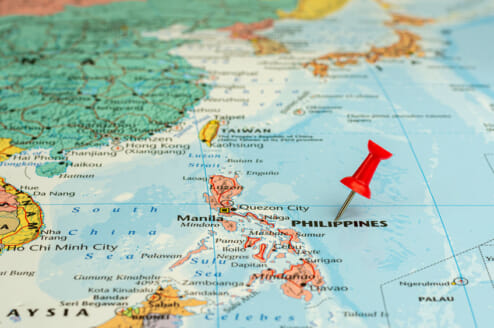
2021.09.07
SDGs17ゴールの達成に向けた事業開発
【第5回】東南アジアの水ビジネスの機会
途上国ビジネス支援担当
- SDGs
- サステナビリティ
- 公共サービス
- 途上国支援
-

2020.11.26
SDGs17ゴールの達成に向けた事業開発
【第4回】新たな競争戦略としてのSDGs
杉本 陽子
- DX
- ESG
- SDGs
- 新規事業
- 経営戦略
- 途上国支援
-

2020.05.21
SDGs17ゴールの達成に向けた事業開発
【第2回】アフリカで加速するヘルスケアビジネスの可能性
大島 佳菜
- SDGs
- ヘルスケア
- 途上国支援
-

2020.03.16
SDGs17ゴールの達成に向けた事業開発
【第1回】観光振興によるSDGsへの貢献
三浦 雅子
- SDGs
- 公共サービス
- 観光開発
- 途上国支援




